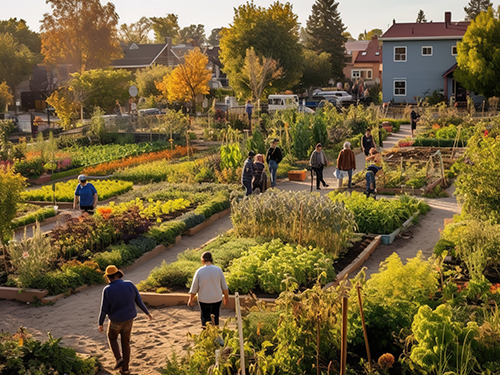
Fact Sheet FS1366
Growing plants and vegetables in communal spaces, including community gardens, has been shown to positively impact mental health by reducing stress, anxiety, and depression. Community gardens can serve as inclusive, therapeutic spaces that promote social connections, enhance physical well-being, and support healthier lifestyles by empowering individuals to grow their own food, contributing to improved nutrition and overall well-being.1 For individuals facing mental health challenges, gardening can have many therapeutic benefits such as reduced stress and anxiety, improved mood, and enhanced mindfulness. Individuals who have been diagnosed with a physical, psychiatric, or developmental disability or have experienced a difficult life circumstance or sudden loss may benefit from facilitated therapeutic intervention from a professionally registered Horticultural Therapist.
Healthcare providers and community-based organizations often use community gardens as tools to address mental health concerns and/or enhance wellness programs. By facilitating gardening events or activities and ensuring accessibility for diverse community members, community-based organizations and providers have opportunities to create environments that encourage healing and resilience. This fact sheet is designed to highlight the connection between community gardening and mental health, providing actionable insights for community members, healthcare providers, and organizations.
Definitions
- Adverse Childhood Experiences (ACEs): Potentially traumatic events that occur during childhood.
- Trauma: A physical, cognitive, and emotional response to harmful or life-threatening events.
- Mental Health: A state of well-being that allows individuals to cope with life's stresses and contribute to their community.
- Community Gardening: The activity of growing and maintaining plants by a group of people, which can provide therapeutic and aesthetic benefits.
- Horticultural Therapy: A treatment modality facilitated by a Professionally Registered Horticultural Therapist to achieve mental health, rehabilitation, and vocational goals.
Mental Health and Trauma in New Jersey Communities
New Jersey faces significant mental health challenges due to risk factors that contribute to increased rates of trauma such as high population density, socioeconomic, and health disparities. These challenges disproportionately affect low-income and marginalized groups, exacerbating symptoms of stress, anxiety, and depression, and can impact most areas of functioning in life such as the ability to effectively engage in interpersonal interactions, maintain relationships, and engage in healthy self-care approaches to cope with daily life stressors. Stressful and traumatic events that result from factors such as living in high population density and having low socioeconomic status are referred to as Adverse Childhood Experiences (ACES), and these experiences as linked to increased risk for common mental health disorders such as anxiety and depression.The most studied connection between ACES and mental health is the link between ACES and Depression. According to New Jersey State Health Assessment Data, 19.6% of New Jersey adults had a reported history of depression. A history of diagnosed depression was significantly higher for women (21.5%) compared to men (14.9%) in 2021. Salem, Cumberland, Hunterdon, Cape May, and Camden counties are ranked with the highest percentage of depression among its residents. For families, caregiving demands, and financial strain often contribute to heightened mental health disparities. Community gardens offer a practical, nature-based approach to address these concerns, fostering resilience and promoting mental well-being.
Trends in Gardening and Mental Health
There have been multiple benefits of gardening for mental health, including its ability to reduce stress, improve mood, and foster social connection while simultaneously improving psychological well-being through improving neighborhood connection, trust, and social networking. Gardening also enhances cognitive functions like memory and focus, making it an effective tool in mental health interventions for individuals with depression and anxiety. Participating in community gardening activity has been shown to significantly improve health outcomes such as overall life satisfaction, feelings of happiness, and a sense of belonging in the community. This growing body of research underscores gardening's role in modern mental health care as a nature-based therapy.
How Green Spaces and Gardening Enhance Well-Being
- Gardening promotes physical activity, reducing the risk of chronic diseases.
- Spending time in nature alleviates stress and elevates mood.
- Being in the garden allows individuals to step away from life stressors and achieve a temporary sense of respite.
- Gardening fosters social interaction and a sense of belonging.
- Growing fresh produce improves nutrition and encourages healthier eating habits.
- Facilitated gardening interventions by a professionally registered Horticultural Therapist help to explore new ways of ‘being' and ‘doing' that can be transferred into other areas of our lives.
Positive Outcomes of Community Gardening
- Sense of Accomplishment: Cultivating plants provides a feeling of control and success, boosting confidence.
- Mindfulness and Relaxation: Gardening encourages mindfulness practices, helping reduce daily stress.
- Social Connection: Shared gardening spaces foster interactions and build a sense of belonging.
- Emotional Resilience: Gardening can be a therapeutic outlet for managing emotions and fostering well-being.
Community gardening offers a promising approach to improving mental health by combining physical activity, social connection, and access to nature. As studies increasingly highlight its therapeutic benefits, integrating gardening into public health strategies can address urbanization challenges and mental health disparities. By fostering inclusive and accessible gardening spaces, communities can enhance resilience, well-being, and quality of life for all residents.
Activities to Promote Mental Health in Community Gardens
Community gardens offer opportunities for hands-on activities that support mental health, such as:
- Mindful Planting: Encourage participants to focus on the sensory experience of planting seeds.
- Harvest Sharing: Organize events where participants share their harvested produce, promoting community bonding.
- Nature Journaling: Offer workshops on documenting experiences in the garden to enhance mindfulness and reflection.
- Seasonal Workshops: Host events like composting tutorials or plant care sessions to build knowledge and skills.
Engaging in community gardening can be pursued by anyone who wants to garden, however, for individuals who have a mental health, physical health condition, developmental disability, or have experienced a difficult life circumstance such as a traumatic event or sudden loss, seeking treatment with a horticultural therapist may help. Horticultural Therapy is defined by the American Horticultural Therapy Association (AHTA) as facilitated engagement in horticultural activity within the context of a treatment, rehabilitation, or vocational plan. Working with a horticultural therapist who is professionally registered with the AHTA will help individuals experience the full benefits of community gardening and horticulture as a treatment modality.
To find a professionally registered horticultural therapist, search the American Horticultural Therapy Association Membership Directory.
References
- Staniewska M. The impact of community gardens on mental health and well-being. Journal of Community Health. 2022;47(3):121-134.
- Lampert A, Jones B, Richards D. Therapeutic gardening: A systematic review of its effects on mental health outcomes. Psychological Services. 2021;18(4):298-312.
- Young PJ, Smith C, Gonzales M. Nature-based interventions: Assessing the impact of community gardening on resilience and social connection. Public Health Reports. 2020;135(2):153-161.
- Centers for Disease Control and Prevention. Mental health and gardening: A tool for public health intervention. 2021. Accessed Dec 5, 2024.
- Centers for Disease Control and Prevention. Community resilience through gardening initiatives. 2022. Accessed Dec 5, 2024.
- Gregis A, Ginevra MC, Todaro L. Gardening as an intervention for stress reduction: Evidence from Italy. Urban Forestry & Urban Greening. 2021;55:126846.
- Chalmin-Pui L, Holt AR, Griffiths A. The psychological benefits of green spaces: Understanding the therapeutic value of urban gardens. Landscape and Urban Planning. 2021;208:104020.
- Zhang Y, Huang X, Kwan M-P. Urban gardening and mental health: Evaluating accessibility and equity in gardening programs. Social Science & Medicine. 2021;276:113845.
- New Jersey State Health Assessment Data. Mental Health: Depression Indicator Report. New Jersey Department of Health. 2024. Accessed Dec. 23. 2024.
- World Health Organization. International Classification of Functioning, Disability, and Health (ICF). Accessed Jan. 27, 2025.
- Carlson EB, Palmieri PA, Field NP, Dalenberg CJ, Macia KS, Spain DA. Contributions of Risk and Protective Factors to Prediction of Psychological Symptoms After Traumatic Experiences. Accessed Jan. 27, 2025.
- Sahle, BW, Reavley, NJ, Li, W, Morgan, AJ, Yap, MBH, Reupert, A, & Jorm, AF. The association between adverse childhood experiences and common mental disorders and suicidality: an umbrella review of systematic reviews and meta-analyses. Doi: 10.1007/s00787-021-01745-2
- Pantiru, I, Ronaldson, A, Sima, N, Dregan, A, & Sima, R. The impact of gardening on well-being, mental health, and quality of life: an umbrella review and meta-analysis. Doi: 10.1186/s13643-024-02457-9
- Lampert, T, Costa, J, Santos, O, Sousa, J, Ribeiro, T, & Freire, E. Evidence on the contribution of community gardens to promote physical and mental health and well-being on non-institutionalized individuals: a systematic review. Doi: 10.1371/journal.pone.0255621
- The American Horticultural Therapy Association. Definitions and positions. Accessed Feb. 12, 2025.
April 2025
Copyright © 2025 Rutgers, The State University of New Jersey. All rights reserved.
For more information: njaes.rutgers.edu.
Cooperating Agencies: Rutgers, The State University of New Jersey, U.S. Department of Agriculture, and Boards of County Commissioners. Rutgers Cooperative Extension, a unit of the Rutgers New Jersey Agricultural Experiment Station, is an equal opportunity program provider and employer.



